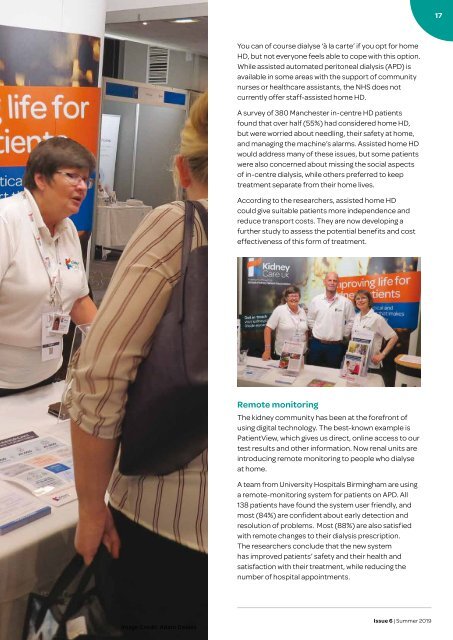Kidney Matters - Issue 6, Summer 2019
Kidney Matters is our free quarterly magazine for everyone affected by kidney disease. This issue includes another recipe for our Kidney Kitchen as well as articles about dialysis transport, UK Kidney week, conservative treatment, and an interview with a retiring dialysis nurse after 33 years. We know that being a kidney patient can be tough at times and that accessing the right help at the right time isn’t always easy. We’ve spent a great deal of time over the past year talking to kidney patients on dialysis, asking them what we can do to address this. The response was overwhelmingly ‘improved communication’ on what is going on in the kidney world and what is available to them in terms of support and how to access it. Kidney Matters has been developed to tackle this as well as the many other issues kidney patients face in day-to-day life. Along with shared patient experiences, Kidney Matters provides on how to access emotional and practical support, financial assistance through our grant schemes, advice from leading kidney specialists and tips on how to keep as well as possible by eating a healthy diet whilst on dialysis.
Kidney Matters is our free quarterly magazine for everyone affected by kidney disease.
This issue includes another recipe for our Kidney Kitchen as well as articles about dialysis transport, UK Kidney week, conservative treatment, and an interview with a retiring dialysis nurse after 33 years.
We know that being a kidney patient can be tough at times and that accessing the right help at the right time isn’t always easy. We’ve spent a great deal of time over the past year talking to kidney patients on dialysis, asking them what we can do to address this. The response was overwhelmingly ‘improved communication’ on what is going on in the kidney world and what is available to them in terms of support and how to access it.
Kidney Matters has been developed to tackle this as well as the many other issues kidney patients face in day-to-day life. Along with shared patient experiences, Kidney Matters provides on how to access emotional and practical support, financial assistance through our grant schemes, advice from leading kidney specialists and tips on how to keep as well as possible by eating a healthy diet whilst on dialysis.
Create successful ePaper yourself
Turn your PDF publications into a flip-book with our unique Google optimized e-Paper software.
17<br />
You can of course dialyse ‘à la carte’ if you opt for home<br />
HD, but not everyone feels able to cope with this option.<br />
While assisted automated peritoneal dialysis (APD) is<br />
available in some areas with the support of community<br />
nurses or healthcare assistants, the NHS does not<br />
currently offer staff-assisted home HD.<br />
A survey of 380 Manchester in-centre HD patients<br />
found that over half (55%) had considered home HD,<br />
but were worried about needling, their safety at home,<br />
and managing the machine’s alarms. Assisted home HD<br />
would address many of these issues, but some patients<br />
were also concerned about missing the social aspects<br />
of in-centre dialysis, while others preferred to keep<br />
treatment separate from their home lives.<br />
According to the researchers, assisted home HD<br />
could give suitable patients more independence and<br />
reduce transport costs. They are now developing a<br />
further study to assess the potential benefits and cost<br />
effectiveness of this form of treatment.<br />
Remote monitoring<br />
The kidney community has been at the forefront of<br />
using digital technology. The best-known example is<br />
PatientView, which gives us direct, online access to our<br />
test results and other information. Now renal units are<br />
introducing remote monitoring to people who dialyse<br />
at home.<br />
A team from University Hospitals Birmingham are using<br />
a remote-monitoring system for patients on APD. All<br />
138 patients have found the system user friendly, and<br />
most (84%) are confident about early detection and<br />
resolution of problems. Most (88%) are also satisfied<br />
with remote changes to their dialysis prescription.<br />
The researchers conclude that the new system<br />
has improved patients’ safety and their health and<br />
satisfaction with their treatment, while reducing the<br />
number of hospital appointments.<br />
Image Credit: Adam Deeley<br />
<strong>Issue</strong> 6 | <strong>Summer</strong> <strong>2019</strong>

















